 |
|
7th
September 1931 to 3rd January 2009
|
| Obituary written by Rob Howard.
Historical photographs provided by Rob Howard. |
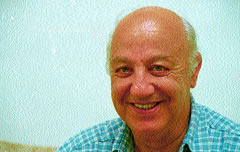 In
the 1950s and 60s, Charles Camilleri was one of the world's best-known
and most admired international accordionists, and he performed in many
countries worldwide. Camilleri was a familiar figure in Britain during
these years, and was the chief guest artiste at the 1958 and 1966 NAO
'Accordion Day' All-Britain Championships concerts. In
the 1950s and 60s, Charles Camilleri was one of the world's best-known
and most admired international accordionists, and he performed in many
countries worldwide. Camilleri was a familiar figure in Britain during
these years, and was the chief guest artiste at the 1958 and 1966 NAO
'Accordion Day' All-Britain Championships concerts.Born in Malta on September 7th 1931, Charles was immersed in the accordion and the piano from a young age. He formed a band whose members were all aged under sixteen, playing at local functions, and was also performing as a solo accordionist in concerts. At the age of twelve, Charles became the first accordionist to appear in concert at the Opera House in Malta, playing selections from La Traviata, accompanied by a 40-piece orchestra. 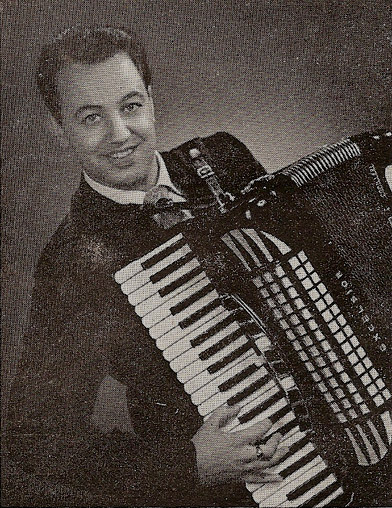 As a teenager, Charles played with every orchestra in Malta, on accordion
and piano, and also played in small combos specialising in Continental
style dance music. He was very versatile, equally at home in a range of
genres, including classical music. After one such performance on the classical
platform, Camilleri was encouraged to pursue a career in music by the
tenor Tito Gobbi, of the New York Metropolitan Opera House.
As a teenager, Charles played with every orchestra in Malta, on accordion
and piano, and also played in small combos specialising in Continental
style dance music. He was very versatile, equally at home in a range of
genres, including classical music. After one such performance on the classical
platform, Camilleri was encouraged to pursue a career in music by the
tenor Tito Gobbi, of the New York Metropolitan Opera House.In 1949, Camilleri's father took the family to Sydney, Australia, where he had secured a job as a tuner/repairer for Hohner. Charles formed a combo that played in nightclubs and jazz venues, and did many radio broadcasts. He also taught the accordion, founded his own Accordion Academy, and published his Studies for the Piano Accordion. In 1955, Camilleri attended the CIA Coupe Mondiale World Championships, held in Brighton, England, not as a competitor, but as the Australian representative. In 1950s and 60s Camilleri lived variously in Toronto, New York and London. In Britain, Camilleri became a familiar and welcome figure at NAO and BCA accordion events - adjudicating, performing, teaching and holding master classes. He wrote The Camilleri Complete Accordion Method, published in 1958 by Francis, Day & Hunter Ltd. In 1960 he recorded an LP titled Spectacular Accordions. 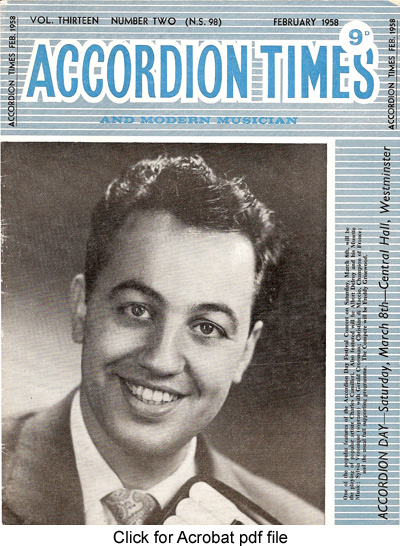 When
Malcolm
Gee organised his very first Autumn Accordion Festival, held at Pontins
Sands Bay Holiday Camp in Somerset in November 1982, Camilleri was present. When
Malcolm
Gee organised his very first Autumn Accordion Festival, held at Pontins
Sands Bay Holiday Camp in Somerset in November 1982, Camilleri was present.Charles Camilleri, long acknowledged as Malta's national composer, composed hundreds of works for accordion, piano, organ, clarinet, violin, oboe, groups, orchestras and choirs. His compositions included the Malta Suite, Maltese Dances, A Maltese Overture - Din l-Art Helwa, operas in Maltese, a ballet based on the Knights of Malta and the oratorio Pawlu ta' Malta. As far back as 1949, a concert consisting entirely of Camilleri's works took place in Malta. Camilleri's compositions for accordion include Magic Fingers, Accordiana, Evening in Paris, Accordion Samba, June, Australiana, Danza Latina, Corinne and Concerto for Accordion and Strings. Camilleri also worked in films. In 1957 he played the accordion in Seven Thunders, a war film starring Stephen Boyd, James Robertson Justice and Kathleen Harrison, and in 1987 he had an acting role as a musician in the film High Tide, starring Judy Davis. He also composed music for films. Charles Camilleri was the composer of the 1964 CIA Coupe Mondiale Test Piece Danza Latina. In 1965, Camilleri organised the CIA Coupe Mondiale, held in the Maltese capital Valetta. 1972 Camilleri's contribution to the worldwide accordion movement was recognised with the CIA Merit Award. Camilleri was widely recognized as one of the major composers and orchestral conductors of his generation. He moved on from the accordion world to establish himself in classical music, and is one of a very few accordionists to make an even greater name for himself in a wider musical context. Charles Camilleri suffered a stroke a couple of years ago, and died on January 3rd 2009 at the age of 77. His funeral took place on January 5th at Naxxar, his town of residence for a long time. The number of people who attended the service, as well as the fact that flags across Malta were flown at half-mast on the date of his death, is evidence of the great impact he had on the people of Malta. |
|
Rob Howard
|
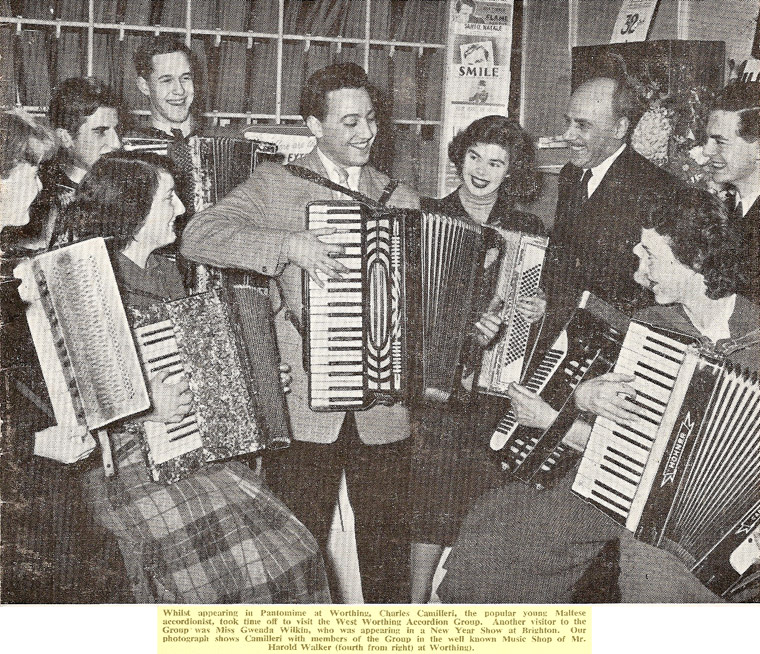
| From Accordion
Times Magazine, February, 1955 front cover. Whilst appearing in Pantomine
at Worthing, Charles Camilleri, the popular young Maltese accordionist
too time off to visit the West Worthing Accordion Group. Another visitor
to the Group was Miss Gwenda Wilkin, who was appearing in a New Year Show
at Brighton. Our photograph shows Camileri with members of the Group in
the well known Music Shop of Mr Harold Walker (fourth from right) at Worthing.
|
From Yvonne Attard - sister of Professor Charles Camilleri, 4th January 2009 In 1949 at the age of 18 from Malta, Charles together with his parents Carl & Josephine and little sister Yvonne migrated to Australia. They settled in Sydney in the early 1950's. Charles made a name for himself with the piano accordion. He made appearances on the Showboat, Tivoli, & Theatre weekly shows at Eden Park. His many concerts, radio shows etc. He taught music at Nicholson's in the city and Gallaghers at Parramatta. He went to entertain the troops in Korea. At this time he was so very well known, together with Enzo Toppano, Gus Menzie, Tommy Tyco & Jeff Harvey etc. After achieving everything he possibly could in Australia, he ventured out in 1954 to try his luck overseas. There he became very well known not only in his birthplace Malta and all over Europe, but London, Canada & America. He leaves his wife Doris, son Charles, daughter Anya, 5 grandchildren in Malta and his only sister Yvonne Attard in Sydney Australia. |
| List of Accordion Works The Camilleri Complete Accordion Method, published in 1958 by Francis, Day & Hunter Ltd. * 1964 CIA Coupe Mondiale Test Piece Danza Latina. * Magic Fingers * Accordiana * Evening in Paris * Accordion Samba * June * Australiana * Corinne * Concerto for Accordion and Strings. List of Major Works for Other Instruments * Piano Concerto No. 1 "Mediterranean" (1948, revised 1978) * Piano Concerto No. 2 "Maqam" (1967/8) * Piano Concerto No. 3 "Leningrad" (1986) * Malta Suite (1946) * Cello Concerto (1992) * Flute Concerto (1993) * Clarinet Concerto (1981) * Organ Concerto (1983) * Piano Trio (1972) * Missa Mundi, for organ (in five movements: 1. The Offering; 2. Fire over the Earth; 3. Fire in the Earth; 4. Communion; 5. Prayer) (1972) * Morphogenesis, for organ (in five movements: 1. Le Cœur de la Matière; 2. L'énergie humaine; 3. L'atomisme de l'esprit; 4. Activation de l'énergie humaine; 5. Le monde de la Matière) (1978) * Wine of Peace, for organ (1976) * Cosmic Visions, for strings (1976) * Noospheres, for piano (1977) * L'amour de Dieu, for organ (1978) * Maltese Cross, opera (performed in Paris in 2003 conducted by Christophe Vella) |
| Parties pay tribute to
Charles Camilleri by Bernard Busuttil Published by the Malta Independent Online, Sunday, January 18, 2009. http://www.independent.com.mt/news.asp?newsitemid=81086 |
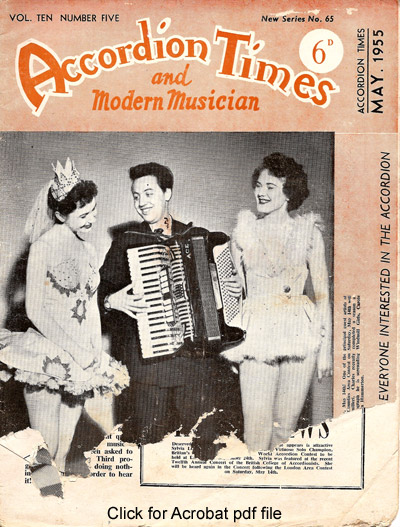 Following
the death of composer Charles Camilleri on Saturday, the main political
parties in the country have publicly expressed their grief at the demise
of the composer who rediscovered Maltese folk music and exported it
to the world. Following
the death of composer Charles Camilleri on Saturday, the main political
parties in the country have publicly expressed their grief at the demise
of the composer who rediscovered Maltese folk music and exported it
to the world.Education Minister Dolores Cristina paid tribute to the maestro and professor of music; "with the death of Mro Charles Camilleri, Malta lost a son that made a name for her in both the local and international music scene." The minister said the cultural world has lost a man that had so much loved it and strived through his life to put it at par with the other, larger countries. Mro Camilleri started composing music at a tender age, at 11 he wrote a band march, his first works were already being performed in London and the US by the time he was 23. The first concert of strictly Mro Camilleri's music took place at London's Festival Hall in 1968 with his second piano concerto "Maqam" given its world premier at the 1970 Expo in Japan. In 1972, the prestigious recording company DECCA recorded his Missa Mundi, a five-movement piece for the pipe organ which his publisher nicknamed "the organ's Rite of Spring. This comparison with Igor Stravinsky's "The Rite of Spring" was elicited with the groundbreaking techniques used by Mro Camilleri in his work for the pipe organ, that were as innovative to the instrument as Stravinsky's 1913 ballet for the genre. His third piano concerto was premiered in St Petersburg (at the time Leningrad) in 1987 while his cello concerto was premiered at the Helsinki Festival. Mro Camilleri, in collaboration with Joe Friggieri, wrote the first opera in Maltese, Il-Weghda, a pastoral opera whose storey is reminiscent of Pietro Mascagni's Cavalleria Rusticana and its music highly evocative of the Maltese countryside. It was last performed at the Manoel Theatre in 2007. It was intended to celebrate the maestro's 75th birthday; however, he had suffered a stroke some months earlier. The duo also wrote the first oratorio in Maltese, Pawlu ta' Malta, which was premiered at St John's Co-Cathedral in 1985 and was also broadcast on the Vatican radio. It was last performed last year at St Paul's Bay parish church. The oratorio Dun Gorg!, also penned by Prof. Camilleri and Prof. Friggieri, celebrated the life of the Maltese saint was premiered in 2001. Among his, oeuvres which exceed 300 pieces, one cannot but mention the Malta Suite (1946) and The Maltese Cross (1995). Half of his works are recorded in over 35 CDs and sold world wide with works used as examination pieces, as was his laconic Cantilena. Besides writing music, Mro Camilleri also wrote about music, two of which are Mediterranean Music, written in collaboration with Rev Peter Serracino Inglott, published in 1988 by UNESCO and The Folk Music of Malta published by the University of Malta. He was awarded Gieh ir-Repubblika and has set on the Malta Arts and Culture board and founded the Malta International Choir Festival. Labour Party spokesmen Evarist Bartolo and Owen Bonnici paid tribute to one of the country's greatest composers and said that the party holds his works as a unique Maltese and European patrimony. Charles Camilleri, said the PL, will be remembered for the way he used Maltese folkloristic music and Maltese legends in his music and for Pawlu ta' Malta and Cantilena. Alternattiva Demokratika said it joined the Maltese population in mourning the death of Mro Camilleri. Party chairman Arnold Cassola said, Prof. Camilleri was fundamental in the revival of Maltese traditional music. "Thanks to him," he said, "our country rediscovered traditional Maltese music which had been hitherto ignored. Thanks to him, young Maltese musicians and researchers are today recouping our musical identity, which would otherwise have been lost. Thank you Maestro: your music will continue resounding in our hearts and spirit." |
| Article written in Malta
Today Newspaper, 24 June 2001 by Ramona Depares http://www.maltatoday.com.mt/2001/0624/people.html |
| Fact file |
| Born: 7 September 1931 in Hamrun (a town in the Inner Harbour Region of Malta, with a population of 9,513 people). Education: The Lyceum and the University of Toronto. He was the first professor of music at Malta University Has lived and worked in: Australia and the UK, as well as his native Malta Well-known for: Writing the first opera in Maltese, 'Il-Weghda' and his interest in Maltese folk music, which led to wider scientific research in music of the Mediterranean Also: Has had over 150 works published by Novello, Boosey and Hawkes, Lengnick and Roberton Married: To Doris Vella Children: Two; a son, Charles and a daughter, Anya Musical notes, and recollections Despite his parents' misgivings, charles camilleri followed his instincts and took up a musical career that has been hugely successful, both here and abroad. Today he tells Ramona Depares about his decision to gamble on a career in music and the road he took to achieving his goals. Many musicians and composers are afraid of the word 'chaos' and of the lack of order and structure that the word, even when applied to a music score, implies. Not Charles Camilleri. The maestro, lauded the world over for his gifted talents, positively thrives on musical chaos and the opportunity for creativity it offers. Indeed, in 'Thoughts and Observations on Music', one of Prof. Camilleri's books on the subject, he is quoted as saying that "order really exists in chaos - everything is presented to us in chaos. The artist does not impose order on chaos but rather discovers the order already present in that chaos". His formula seems to have worked. Prof. Camilleri is probably the most successful and well-known composer in Malta: his original works have been played in various countries, including London and the States. His is one of the few names that anyone who has some Maltese blood running in his veins invariably recognises, whether or not he is interested in music. "I have always had music in my house," he said. "My mother used to play the guitar, we were all quite musical. But from the very beginning I remember that I wanted to create my own music and not just play someone else's! This rebellious streak of creativity often got me into trouble with my piano teacher. I would always re-arrange the pieces she gave me to practise at home to suit my own liking." And so his early childhood was spent practising the piano and being told off for daring to "re-arrange" Mozart or Beethoven. "My father used to say I had crooked ears!" The composer said, laughing affectionately at this recollection. Then came the young pianist's eleventh birthday and the creativity which had till then been bubbling under the surface was allowed a free reign. The result was a lively 'festa' march which was played at the village feast. This seemed to seal Prof. Camilleri's fate: even at such a young age he knew that his future was with music. "I actually got paid a pound note by the band for that composition," he said, the pride of recollection lighting up his eyes. Perhaps surprisingly, the Camilleri family were not too keen to have their son choose that particular road, with both his mother and father scared that the teenager would abandon his academic studies in favour of the arts. It was a frequent occurrence for the composer's father to give away the boy's piano, hoping, as it were, to dampen his enthusiasm. Just as frequently, the pianist's mother would rent it back while her husband was away on business. "My mother was always the softer one!" he said, laughing. "More often than not she'd give in to my musical demands. Dad, on the other hand, would caution me and re-iterate time and time again that if I weren't careful I'd end up playing the piano in Valletta's notorious Strait Street! Today I don't blame him. If you look at what most musicians of the time did, playing in Strait Street was exactly it. Åfter all, it was the sole entertainment spot on the island." Luckily, his father's fears never materialised: the worried parent, in fact, managed to persuade his son to complete his academic studies at the Lyceum before dedicating his life to music. Not that Prof. Camilleri's interest waned: at the Lyceum he would spend most of his money on buying biographies of well-known composers. "Reading these biographies was almost like seeing my life in print, or rather the life I wanted to make for myself. Even back then I used to tell myself that I wanted to do for Malta the same as these composers had done for their countries. I wanted my brand of music to be known," Prof. Camilleri continued. I asked whether he considered himself to have been lucky. "I believe that if you believe in something strongly enough in life, if you are really determined to succeed at what you set your mind to, then you'll make it. The important thing in life is the journey and not the destination,' the maestro replied. By the time he was at the Lyceum, his taste in music had taken a definite orientation. The family business often took the Camilleri family to Tunis and when it did, the young Charles accompanied them. It was there that he first became acquainted with folk music and the Eastern version of 'ghana'. Back home, he would use his father's Filco radio to tune into Eastern folk music stations. "Listening to the 'ghana', I realised that what my music teacher was teaching me did not tally with everybody's taste. The folk people enjoyed different tunes and music. I knew something was different and was determined to do something about it," he explained. A highlight in his youth that he still remembers with great pleasure, was being taken to the Proms in London by the Lyceum. Listening to the music at the Royal Albert Hall he suddenly made the firm decision that his life would take a musical direction. Back home, his family - although suspecting it for quite a while - was not exactly elated. "I think they wanted me to take on what they called a proper job, meaning a nine-to-five one," he admitted. "They did not view musicians as job-holders! But I don't believe in that kind of thing. After all, the office job scenario is a con that we ourselves have created. Who says that life has to revolve around a traditional office job? Think of how limiting to creativity these jobs are." I asked the musician what he meant by this statement. "How many people are stuck in the same daily routine?" he asked. "They wake up, go to the office, get back home, watch some TV and go to sleep. And then they open their eyes the following day and it's the same old story over again. Can you imagine anything more boring? No wonder I chose a life of music and creativity over this kind of life!" The turning point came on Prof. Camilleri's eighteenth birthday, when the whole family emigrated to Australia, which at the time was 'a cultural desert'. The aspiring composer decided that two years of this desert were more than enough and when he was 20 he upped and left for London on his own. "I was young, I had no job but I wasn't about to give up without trying," he said. "In London I met Harold Fielding the impresario and ended up spending some five years touring theatres there. I wrote music, I conducted and I managed to integrate myself in the musical circle and got to know the people who mattered. London became my second home." Enjoyable as it was, when opportunity beckoned Prof. Camilleri, now in his mid-twenties, flew off to America, was asked to do some programmes there and spent what he described as the most exciting 10 years of his life. "To be in New York in the 60s was electrifying," he said. "In the States and Canada I did everything, everything related to music, that is. I conducted, I wrote film scores, I was published and then I was appointed conductor with CBC - a wonderful opportunity. Naturally I loved the money, however, around 1965 I decided to quit and dedicate the rest of my life to composition." And so it was back to London, where the maestro was musically interviewed by Arthur Jacobs on the BBC. It was then that Prof. Camilleri was introduced to Basil Ramsey (head of publications at Novello's, London) and Bernard Hermann (the composer who wrote the scores for Hitchock's movies). He was signed up with them as a composer and from then on dedicated his career to full-time composing, dividing his time between London, Malta and other countries. To date, his compositions number over 300, of which half are recorded on about 36 CDs which have been sold all over the world. And Malta? Throughout the time he was abroad, Prof. Camilleri still kept closely in touch with his island of birth. In his own words, he "loved the Mediterranean atmosphere too much". Which is why, 10 years ago, the composer returned to Malta to make it his base. "I could not survive without travelling," he admitted. "But I like to know that my home in Malta is always here to come back to." His assessment of the Maltese artistic scene is by no means negative; indeed, he believes that the talented musicians and artists are many - but few develop this talent into something lasting. "Most Maltese have become critics and not actors," he said. "We criticise rather than take action and this has to change. But it's a joy to see that everywhere more and more young people are turning to the arts. After all, creativity gives us a form of fulfilment and spirituality." A fulfilment that is extended to all his family: his wife Doris is an established writer, his daughter Anya works in the film industry while his son Charles chose to follow his father's footsteps by becoming a composer. And his future plans? Many, it seems. After having last week premiered a new work inspired by the Mnajdra Good Friday disaster, the coming few months will see him featured in various festivals all over Europe. As he himself says, these days, flying to Sweden or England is pretty much the same as catching the bus to some Maltese village. |
|
Ramona
Depares
|
|
© Copyright 2009 Accordions Worldwide. All rights reserved. |